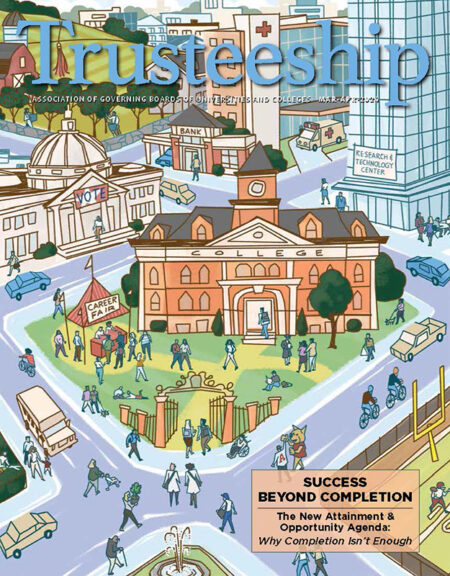
In the current conversation about the value of higher education, personal economic gain reigns supreme. Some states are examining whether to tie performance funding for institutions to graduates’ first-destination salaries, immediately after college. Given that many stakeholders (including students) expect a college degree to lead to a good job, this approach seems like common sense, especially when considering the level of debt that some students shoulder to earn their degrees.
However, this attitude is not so much wrong as incomplete. Immediate economic returns are certainly important—no institution wants a student to be in debt decades after they graduate—but relying on this sole metric diminishes the benefits that higher education provides to individuals, our society, and our democracy as a whole. This approach narrows the possible courses of study institutions value. Since boards ultimately are responsible for institutional outcomes, it is crucial to consider all the benefits that higher education provides, so that board members know what questions to ask, what metrics they want to see, and in what strategies they need to invest.
The “Trap”
It is easy to understand why regulators, policymakers, and even some board members are eager to use first- or second-year post-baccalaureate salaries as a barometer for institutional success. In the digital age, we can and should demand data to inform our decision-making. And salary data are easy to measure. They allow for comparisons. There are fewer confounding factors to cause differentiation in compensation other than degree completion. It also appears to be a great metric for students who pursued a degree primarily for economic benefit.
Unfortunately, it’s a siren song of a trap. It is so easy to measure, in comparison to other harder-to-measure metrics, some stakeholders want to use it as their main indicator—sometimes their only measure—of success. But it’s a biased metric. There are some jobs, like many in STEM careers, where graduates often net immediate and dramatic wage differences between a college graduate and a non-college graduate. Other careers, like teaching, require specific skills but don’t see the same level of economic return. Long-term data (ten-years or more) show that students pursuing humanities and social science majors do just fine but may not score as well on salary measures immediately after graduation.
Over time, higher education has joined corporations in embracing the view that “What gets measured gets managed” (misattributed to Peter Drucker). In my experience, it also means that what we measure is what leadership promotes, advances, and funds. Well-meaning staff and faculty then start, often unconsciously, favoring those metrics. Students end up convinced, sometimes by advisors or faculty or university messaging, to enter a degree program in a field they have no desire to study, which invariably leads to worse academic performance and disengagement. Colleges should provide students with quality advising and transparent data on the full range of career opportunities and long-term graduate earnings to help them make informed decisions about pursuing programs of study that reflect their goals and interests. This enhances student success in and beyond college.
Looking strictly at short-term salary data overlooks other tremendous quality-of-life benefits to graduates and society. In August 2023, the Lumina Foundation released the results of a survey that highlighted both the economic and non-economic benefits of higher education. Those who received additional years of education beyond high school reported being healthier, more engaged in their community, and more likely to find a job that fits their needs.
Another benefit is graduate engagement in democracy. In 2019, AGB released Renewing the Democratic Purposes of Higher Education (https://agb.org/reports-2/democratic-purposes/), a publication that outlined the myriad ways that colleges and universities strengthened democracy, not only through the number of graduates they produced, but also through institutions’ roles as community partners, knowledge creators, and champions of civic life. The report outlined that the skills employers seek, such as information literacy, ethical reasoning, team building, empathy, and a capacity for leadership—skills often attributed to the liberal arts—are also important for a healthy democracy.
The Role of the Board
If your college or university expects immediate economic gains for its graduates, then use that as a metric. But don’t use it as the primary or the sole metric. Consider what other outcomes you value. Those other characteristics, like long-term financial security, health, democratic participation, community engagement, sense of purpose, and joy, are harder to measure. But they are part of the value of higher education. The next time your board meets to review priorities and outcomes, ask about what you don’t yet see in the dashboard.
Mary A. Papazian, PhD, is the executive vice president of AGB.
RELATED RESOURCES

Reports and Statements
Return on Investment in College Education

Reports and Statements
Renewing the Democratic Purposes of Higher Education

